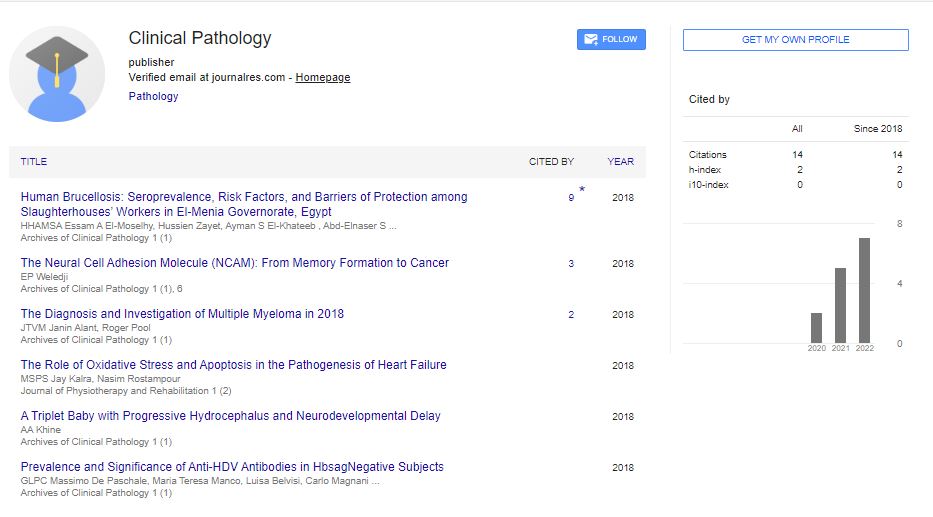Perspective, Arch Clin Pathol Vol: 6 Issue: 1
Significance and Applications of Clinical Chemistry in Modern Medicine
Matthew Ping*
Department of Pathology, University of Utah, Salt Lake City, USA
*Corresponding Author: Matthew Ping
Department of Pathology, University of Utah School of Medicine, Salt Lake City, USA
E-mail: matthewping@ut21.edu
Received date: 20 February, 2023, Manuscript No. ACPY-23-93077;
Editor assigned date: 22 February, 2023, PreQC No. ACPY-23-93077 (PQ);
Reviewed date: 09 March, 2023, QC No ACPY-23-93077;
Revised date: 16 March, 2023, Manuscript No. ACPY-23-93077 (R);
Published date: 23 March, 2023, DOI: 2324-8955/acpy.05.03.100072
Citation: Ping M (2023) Significance and Applications of Clinical Chemistry in Modern Medicine. Arch Clin Pathol 6:1.
Description
Clinical chemistry, also known as chemical pathology or clinical biochemistry, is a branch of laboratory medicine that deals with the analysis of bodily fluids such as blood, urine, and cerebrospinal fluid. It involves the use of various analytical techniques to measure the levels of various substances within these fluids, which can provide important information about a patient's health status. Clinical chemistry plays an important role in modern medicine. One of its most important applications is in the diagnosis and monitoring of diseases. For example, elevated levels of enzymes such as creatinine kinase or troponin in the blood can indicate damage to the heart muscle, which is often seen in patients who have had a heart attack. Similarly, elevated levels of glucose in the blood can indicate diabetes, while elevated levels of bilirubin in the blood can indicate liver disease. In addition to aiding in diagnosis, clinical chemistry is also used to monitor the effectiveness of treatment. For example, patients undergoing chemotherapy may have their blood analyzed to monitor the levels of drugs in their system and ensure that the treatment is working as intended. Similarly, patients with diabetes may have their blood glucose levels monitored to ensure that their treatment plan is effective.
It is also used to monitor the levels of drugs and other substances in the body. For example, patients who are taking medications that have a narrow therapeutic index, such as warfarin, may have their blood analyzed to ensure that the levels of the drug in their system are within a safe range. Similarly, patients who are taking drugs that have a high potential for abuse, such as opioids, may have their urine analyzed to ensure that they are taking the medication as prescribed. One of the main advantages of clinical chemistry is its ability to provide accurate and precise measurements of biochemical substances in biological fluids. This helps in the early diagnosis of diseases, which is essential for effective treatment and management. For instance, measurements of blood glucose levels are used to diagnose and monitor diabetes, while measurements of cholesterol and triglyceride levels are used to assess the risk of developing cardiovascular diseases. It is also used in forensic medicine to determine the cause of death or poisoning or drug overdose. Another important application of clinical chemistry is in the field of toxicology. Clinical chemists can analyse bodily fluids to determine whether a patient has been exposed to toxic substances such as heavy metals or drugs of abuse. This information is important for both diagnosis and treatment, as it can help healthcare professionals identify the cause of a patient's symptoms and develop an appropriate treatment plan.
Conclusion
Clinical chemistry plays a vital role in modern medicine. It is used for the diagnosis and monitoring of diseases, the determination of drug levels and efficacy, and the detection of toxic substances in the body. With the advances in technology, clinical chemistry continues to evolve, providing more accurate and precise measurements of biochemical substances in biological fluids and expanding its applications in various fields such as forensic medicine and biological laboratories. As such, clinical chemistry is an essential component of modern healthcare and will continue to play an important role in the future.
